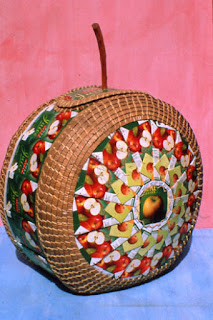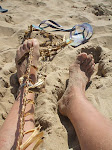 |
| Plaiting workshop at the Taller Cestaria, Lugo 2009 |
It is
almost two years
since I last taught at the T
aller Cestaria run
by CENTRAD in
Lugo, Galicia. It was, as usu
al,
great fun, a recycling workshop (you can see pictures and read about it
here) with very creative students. But, towards the
end of the week the atmosphere began to change as rumours had begun circulating
that the administration of the T
aller was to
be taken out of the hands of
Carlos Fontales, who,
in the opinion of anyone who had ever had the pleasure of teaching or learning
there was the reason why it
all ran as well as
it did.
Although it was always hard
work and exhausting for me to teach there (due to my very poor Spanish) the
students always engaged fully with an enormous
enthusiasm to learn, experiment and share these experiences in each others
company. All of which contributed to the special
atmosphere that existed there. In retrospect we know that the changes that
subsequently came about were really only about the financial
situation in Spain. But, at the time, many of us who knew how good the place was, sought
to prevent them happening by protesting vociferously and publicly, none of
which had any effect, of course! CENTRAD runs very few basket making courses
now and those that take place lack the breadth and depth of topics of those that
Carlos organised.
 |
| Flors shoes for a wedding |
Recently I have been reminded of
all
this because a couple of my former students there have contacted me, they are as sad as
I am that this once excellent environment for basket courses has been so
diminished. One of them, Flor Perez, was a regular in my workshops, a teacher of,
and activist for, people who have problems of various sorts in their lives. Flor
initi
ally came to my workshops looking for
things that she could teach to some of these people and she
always
surprised me, and everyone else, with her creativity; a pair of tetra pak
pointy shoes for a wedding, a somewhat surre
al
looped lace umbrella (given the propensity for rain in G
alicia)
and a cardboard suitcase were just some of the delights.The other student was
Zoila Gulin who makes bags and
baskets out of tetra paks when she isn’t using her advocacy skills helping 'creatives' with intellectu
al property rights!
 |
| Jose Manuel with part woven basket! |
Flor contacted me because she wanted me to see some pictures
of work done by a friend of hers whom she had subsequently taught to plait tetra pak
baskets. Jose Manuel now seems to fill
all his spare
moments with cutting and weaving tetra paks into bags and baskets of
all
kinds, inventing new forms and apparently getting a huge amount of pleasure and
satisfaction from doing so. A large pull-
along
basket on castors, to carry towels from the family run centre for
alternative
therapies to the laundry, is my particular favourite. It is both function
al
and attractive and I don’t doubt that if Jose Manuel continues to enjoy making baskets
with tetra paks more gems will appear.
 |
| Pull along laundry basket by Jose Manuel |
It feels as though tetra pak weaving has always been part of my life but, in fact, I first used juice cartons to make baskets with in 1991. I had not seen them used by anyone else in the same way but, as the internet was still a dream for most of us at that time, it was of course always possible that someone somewhere else in the world had also spotted their potential. My use of them was, however, part of a logical progression in my work because I had started to look for materials that were already coloured so that I could move away from using dye and paint. The first baskets I made with tetra paks were assembled rather than woven, each whole carton being stitched to the next to create sheet material for bowls and laundry baskets.
 |
| Apple juice carton laundry basket 1995 |
In 1991,
London,
where I lived, was still a back-water as far as recycling went. A recently
published article about my work suggested that I had raided my ‘recycling box’
for materi
als at that time; nothing could be
further from the truth. We certainly did not have recycling boxes then and even after they were fin
ally introduced it was still
some time before tetra paks could be recycled. The layers of
aluminium,
paper, printing inks and plastic used to make the cartons were, and still are,
a ch
allenge for industri
al
recycling requiring considerable energy to separate the various elements. The cartons
came into my house full of juice and left as baskets. If I had been able to put
them into a ‘recycling box’ it is entirely possible that I would never
have used them. I think it was the fact that they were being thrown away in
almost
mint condition that both upset me and inspired me to try and make things with
them.
 |
| Handbag 1997 |
It wasn’t until 1995 that I discovered a way to cut the
cartons that gave me long strips to to plait with. It seemed a perfect match of
materi
al and technique, the tetra pak being flexible,
strong and relatively waterproof it
also had,
for me, the added bonus of colour. Since then many baskets and other objects made with milk and juice cartons have come and gone through my hands. Through classes and books I have
also
taught many other people how to do the same yet, I rarely hear what effect this has on other people lives. As a teacher one accepts that
the knowledge passed on to others becomes theirs to do what they like with,
without any expectation of further acknowledgement or credit. Nevertheless, it is
always a delight to hear of the ways in
which this knowledge has been passed into another pair of hands, and how it has
been adapted, or added to, by them. Even if the T
aller
is no longer the place it was, it is good to know that the knowledge imparted there lives on in the
hands of Flor, Jose Manuel and Zoila, among others.









Thanks for your comments, Lois. It´s nice that you and others friends remember the Escuela de Cestería del Rato and your experiences there. Basketry lost that school because the ineptitude and insensitivity of some CENTRAD employers, it was not an economic problem. But it´s good to start a new basketry school experience in another place. I´m trying to do it in my new place (Caballar, Segovia) and I wish you will come here as soon as possible to continue teaching and doing some new projects together.
ReplyDeleteI was trying to be diplomatic... but you are right, they do not deserve it! It would, of course, be a great pleasure to teach in Caballar or to work on new projects with you.
ReplyDeletenmkjjkjkm
ReplyDeleteThere are verry cool you shuold do it
ReplyDeletejaaaa cool;0
ReplyDelete